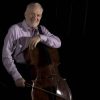Where True Artistry Begins
Ears, Mind, Body – Part 2
- There is a state of being, of heightened listening and physical connection to the instrument, where we are able to transcend “thinking” as our primary means of control.
- Letting go of your “thinking” self frees your intuitive talent, your imagination, and allows for inspiration.
- The mind is too slow to track every shift, string crossing, adjust intonation, shape a phrase, create a mood, ad infinitum—the ear can lead and adjudicate everything simultaneously.
- Touch the cello the way you want it to sound. Allow the music to directly inspire your hands. Let your ears and heart guide the response of your hands to the sounds and feel of the instrument.
- Deepen your physical connection with the instrument so that your hands respond directly to what you hear without the constant need to “think” about it.
- Do not fear becoming emotionally untethered. By strengthening your physical sense of the instrument and your listening, you can let yourself go.
- Thinking is indispensable and essential to the making of music and playing the cello, but more in the learning process than in performance. As you master the instrument and/or a piece of music, free yourself from the “tyranny of thought.”
- Spontaneity is made possible from thoughtful preparation in the practice room. But don’t forget to also practice spontaneity!
- Know in advance of a performance where you need to anticipate a thought essential for successful execution of a physical or musical moment.
- We can easily “overthink” while playing, causing us to get in the way of our own performance. Strive to get to a place where active thinking is in the background.
- Listening, feeling the instrument, and thinking, are not mutually exclusive– they must work together.
- In your practice, active listening is always the best constructive critic.
In performance, active listening brings us into the “zone,” leading us to oneness with the instrument and the music. - Allow your own sounds to inspire you, taking you further than notes on the page and mere physical actions.
- Listening, not conscious thought, should be primary. “Thinking” hovers in the background, operating when needed.
Cellosophy
"There is a “place” we can go where our ears, mind, body become one with each other, and we become one with the music and the cello." -Paul Katz
